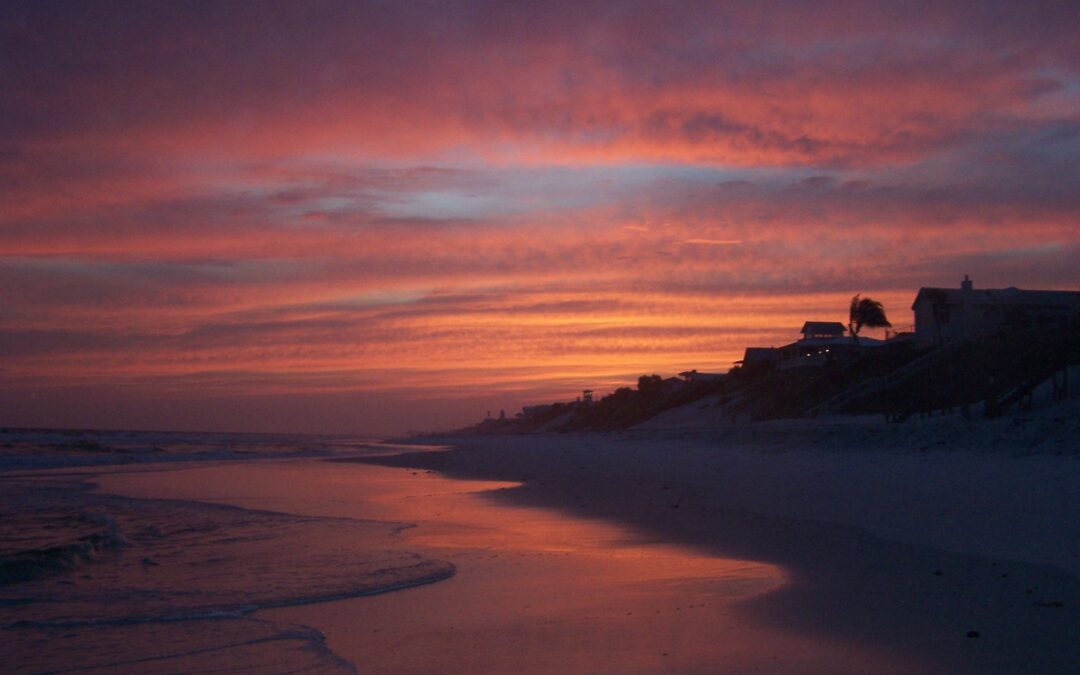BEAUTY AND TRUTH IN PERIL
Every July my family takes a week-long vacation on the Florida gulf coast. The area is gorgeous – famed for its surreal blue water, sugar-white sands, and delicious seafood. We stay right on the beach and spend hours every day in the sand and water, paddleboarding, body surfing, building sandcastles, and savoring magnificent sunsets.
However, in April 2010, something occurred that permanently threatened our wonderful getaway and the beauty of the beach that we love: the Deepwater Horizon oil spill.
As 53,000 barrels of oil gushed out in hideous plumes into the pristine Gulf of Mexico each day, we heard contradictory reports about the Emerald Coast. Some described an ecological disaster: tarred sands, barren fisheries, oil-covered seabirds, noxious hydrocarbon fumes. Other sources minimized the damage and said the oil was deep under the water and would not cause much problem.
Despite satellite maps, news programs, and websites, we could find no definitive answers that we felt we could trust. Getting accurate information was challenging. The nightly news had a vested interest in ratings and so played up the ugly, sensational side of the spill; politicians of various stripes each spun the data for their own political capital, while the tourist industry naturally downplayed any negative repercussions.
Unsure of what to do as our vacation neared, we desperately scoured for information regarding our own cherished beach. Was it polluted, as the news suggested, or still immaculate, as the chamber of commerce insisted? The question was practical (should we travel or cancel our trip?) as well as deeply personal (was our paradise on earth horrifically corrupted?).
AT AN IMPASSE
A major goal of Docsology is to demonstrate how we can perceive and know God through the universe that he has created, especially through the astounding testimony of our own bodies. But we have hit a snag. As the last series (Mixed Messages) showed, what we can learn about God is limited from merely observing nature or searching within ourselves.
The writers of the Bible highlight this challenge. Romans 1 teaches that even though “What can be known about God is plain” and “clearly perceived” through the witness of the material world, our broken intellects limit our ability and our fallen spirits limit our willingness to understand, much less relate to, God.
John 1:18a puts it succinctly: “No one has ever seen God.”
You and I cannot see God. And whether because of our pain, our needs, or sinful motivations, we can easily misconstrue the witness of nature and delude ourselves about God.
We are stuck, and there is no way we can get around this problem on our own, any more than my family could figure out the condition of our favorite beach by researching from a distance or searching our own feelings.
But there was a simple resolution to that beach dilemma in the end, and it will suggest the answer to the broader dilemma of humanity’s challenge of knowing God. The solution had to come from someone else with inside knowledge of the situation.
AN EYEWITNESS ACCOUNT
A realm of golden sunshine enveloped us. Azure water and sugar-white sand blended in a glorious palette. Fresh breezes and salty air mingled in sweet aroma. Crashing surf and crying gulls harmonized beautifully. My family was almost delirious as we ran onto the beloved beach we had feared ruined. Other beachgoers shared our sentiment, laughing and skipping around, while shouting to total strangers. Our vacation was saved, and more importantly, this magnificent site was preserved!
But it was not blind faith that had led us there. When we had been unable to glean any trustworthy information from the news or the internet, we had turned to calling people we knew who had recently been to the area or who lived nearby. Finally an old friend who lived on the coast and who had personally just been to our lovely beach informed us that it was indeed still unsullied.
All the information technology had failed us. All those with questionable motives or limited knowledge – the politicians, talking heads, merchants, and pundits – had let us down. Our own hopes and convictions were of no use. In the end the only thing we could rely on was a first-hand account from a trusted friend, someone closer to the situation.
BIGGER QUESTIONS
I was fortunate to have an old, trustworthy friend close to the situation in Florida. Do you and I have a truthful friend who has deep knowledge of the mysteries of God? Is there someone we can trust to give us something more personal and more precise than the grainy picture of God we get from nature?
John chapter 1 – and indeed the rest of the New Testament – give a firm and resounding answer to these questions. The answer is Jesus Christ, God himself in the flesh and an eyewitness to God the father.
Jesus Christ is a reliable eyewitness who speaks truthfully about God the father. He speaks from firsthand, eternal, deeply personal knowledge. The father and son are intimately related, and indeed are one in the spirit.
Hebrews 1:1,2 reveals that “In the past God spoke to our ancestors through the prophets at many times and in various ways, but in these last days he has spoken to us by his Son, whom he appointed heir of all things, and through whom also he made the universe.”
Jesus can be a trusted friend who can bring us into a relationship with God. John 1:18 says: “No one has ever seen God; the only God, who is at the father’s side, he has made him known.”
May you know the faithful eyewitness and trustworthy friend who is God incarnate this Christmas!
Dr. Bill Maynard
